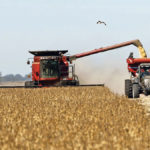There’s a good reason why companies are trying to convince farmers to sell them their land, says a leading U.S. farm finance expert.
It’s because they’ve realized that that’s often where most of the money in farming is made.
Farmers’ yearly profits might be low in average years, but their total return is often better than any other form of business when they sell their land at the end of a long career.
Read Also

August rain welcome, but offered limited relief
Increased precipitation in August aids farmers prior to harvest in southern prairies of Canada.
“We don’t get a high dividend off the land, because historically the margins have been small,” said Virginia Tech professor David Kohl.
“But usually if you hold land over a number of years, the capital appreciation has been fairly solid. When you combine both dividend and capital appreciation (over the long run), it (has been) just behind small cap stocks (as an investment).
“Now that the stock market has been suppressed for 10 years, it has actually exceeded stock investment.”
Non-farmers are buying farmland from farmers around the world.
Some buyers are hedge funds seeking an investment tied to the bullish commodities market. Some are long-term investors, such as pension plans, that want long-term assets to match their long-term obligations.
Some buyers are governments of food-importing nations that are worried about future food supplies.
Kohl said farmers have generally benefited from owning farmland, but that doesn’t show up in their yearly financial results.
“You don’t realize on appreciation until you sell,” he said.
Farmland value has historically risen for long periods of time and then gently corrected for a few years, often declining three to five percent from peak values.
Only twice in the past century, in the 1930s and 1980s, did prices fall by 20 percent or more, he said.
During a presentation about farmland at Manitoba Ag Days in Brandon, a farmer noted that farmland on the Regina plains that was selling for $1,100 per acre in the early 1980s has only recently returned to that value.
He challenged the idea that farmland is a good investment given this kind of volatility.
Brad Farquhar of Assiniboia Capital Corp., which buys farmland and rents it to farmers, said he thinks farmland values will continue to be strong for at least a decade and maybe 20 years.
“I think the next 10 years look terrific,” he said in his presentation.
Kohl said a lot of investment money has flowed into farmland in some parts of the United States, such as the Mississippi Delta.
However, investors have been less active in the U.S. Midwest, where grain farmers are aggressively buying land because of good returns.
“The growing, business-oriented type of producer knows the value of (land price) appreciation,” Kohl said.
“Over the cycles, there has been a fairly good return.”















